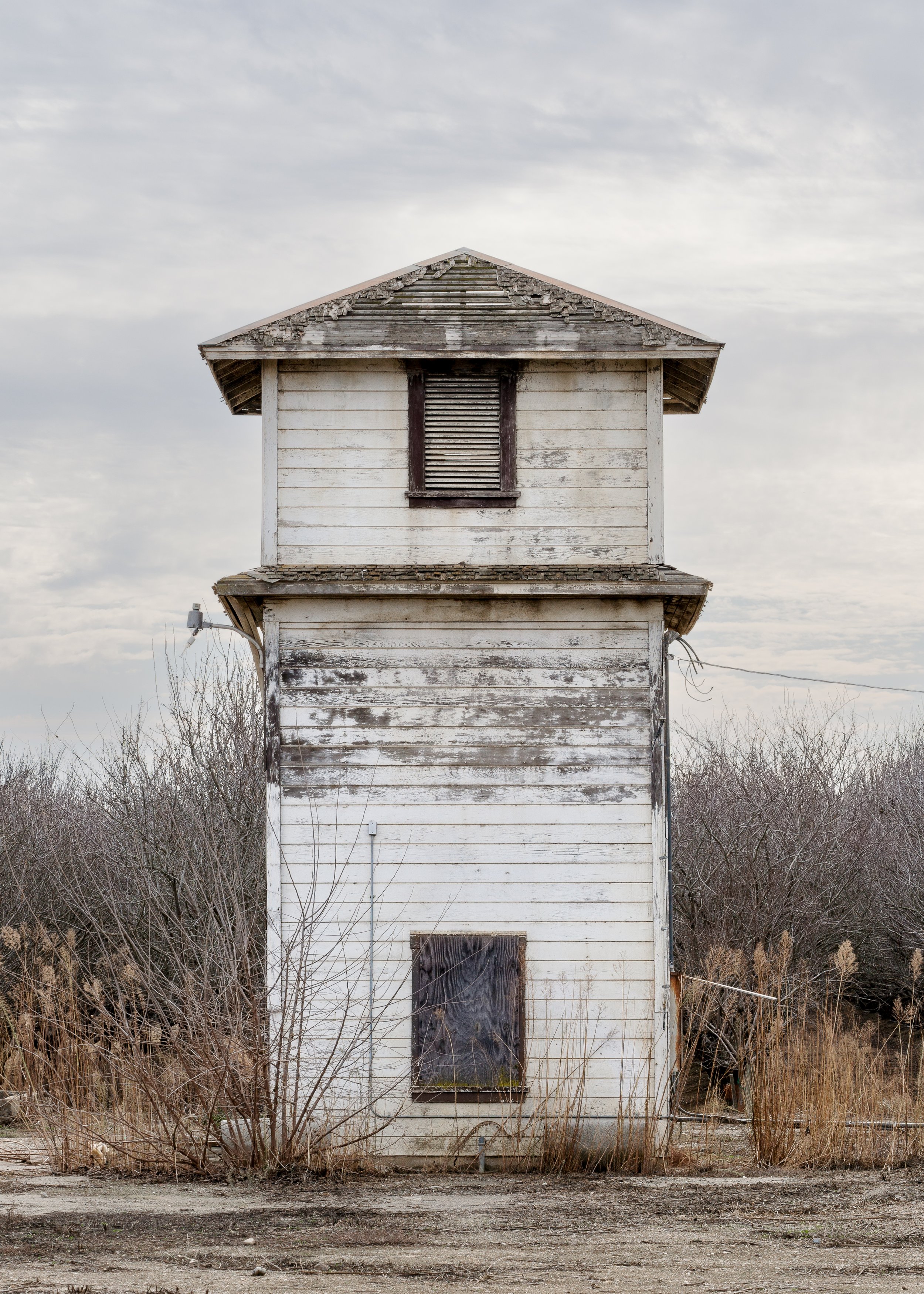The End of Rain (2022)
Music, text, video, and photography by Scott Ordway
3.3.3.3, 4.3.3.1, timp. + 3, hp, pno/cel, strings
eight vocal soloists, video
50 minutes
Also available in a version for SATB choir and chamber ensemble.
For rental information, please contact via email.
The End of Rain is a 50-minute symphonic work commissioned by the Cabrillo Festival of Contemporary Music and featuring Roomful of Teeth. The text is based on crowdsourced stories of wildfire and drought from 225 Californians, accompanied by documentary video by the composer. A related hardcover book of photography is available here.
PREMIERE
Commissioned by the Cabrillo Festival of Contemporary Music
29 July 2022 at the Santa Cruz Civic Auditorium (Santa Cruz, CA)
Cabrillo Festival Orchestra, Cristian Macelaru, Roomful of Teeth
Photography Exhibition: Images from The End of Rain
Kunstverein Familie Montez (Frankfurt am Main)
June–July 2023
PRESS
“Haunting and beautiful.” —San Francisco Chronicle
“Composer Scott Ordway is a 21st-century auteur. His eclectic creations involve music, video, performative installations, poetry and photography. All of this handmade rigor dissolves boundaries while lifting symphonic music into a realm that has no name.” —Good Times Santa Cruz
“Haunting…heartbreaking…a majestic three-part symphony.” —Lookout Santa Cruz
“Cabrillo Festival returns with collection of works that touch on social, political issues.” San Francisco Chronicle (San Francisco, CA)
“Riverside Chorale to Premiere Scott Ordway’s The End of Rain” OperaWire (New York, NY)
“Scott Ordway’s ‘The End of Rain’ Makes World Premiere at Cabrillo Festival” Good Times Santa Cruz (Santa Cruz, CA)
“The Cabrillo Festival’s 60th Anniversary Season With Composers Gabriela Lena Frank And Scott Ordway” KSQD Radio (Santa Cruz, CA)
“Santa Cruz composer reflects on California’s new climate normal in The End of Rain.” Lookout Santa Cruz (Santa Cruz, CA)
“Songs of the Earth.” Symphony Magazine (New York, NY)
“Cabrillo Festival Of Contemporary Music Celebrates 60th Anniversary” Broadway World (Los Angeles, CA)
“Music project seeks your stories and reactions to California’s high wildfire risk.” The Sacramento Bee (Sacramento, CA)
MEDIA
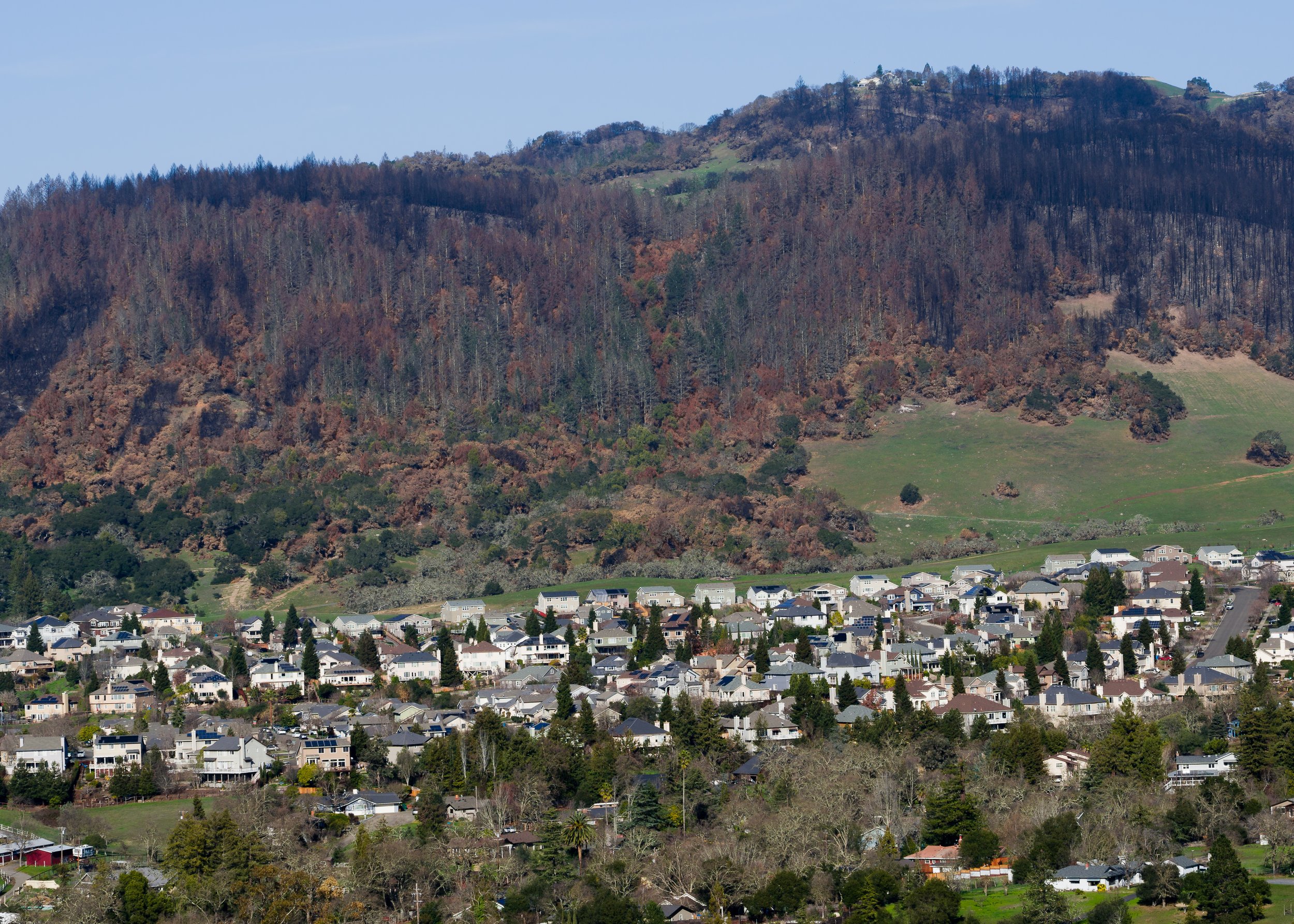
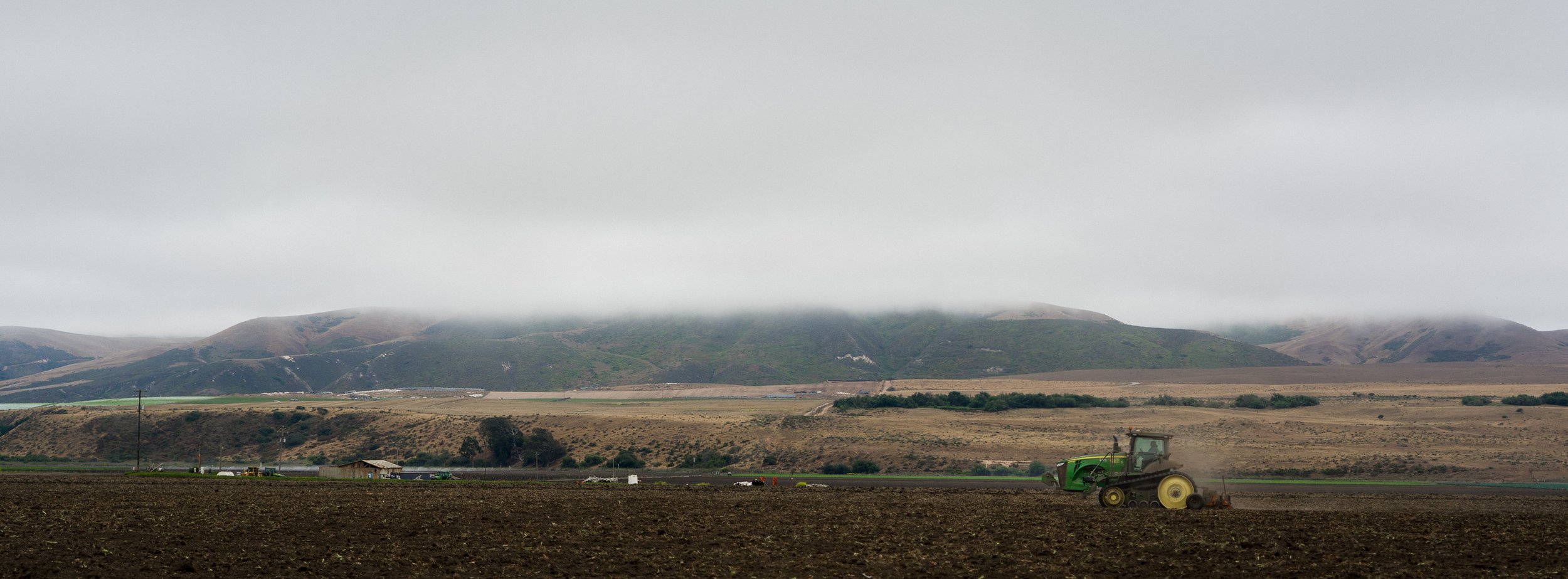

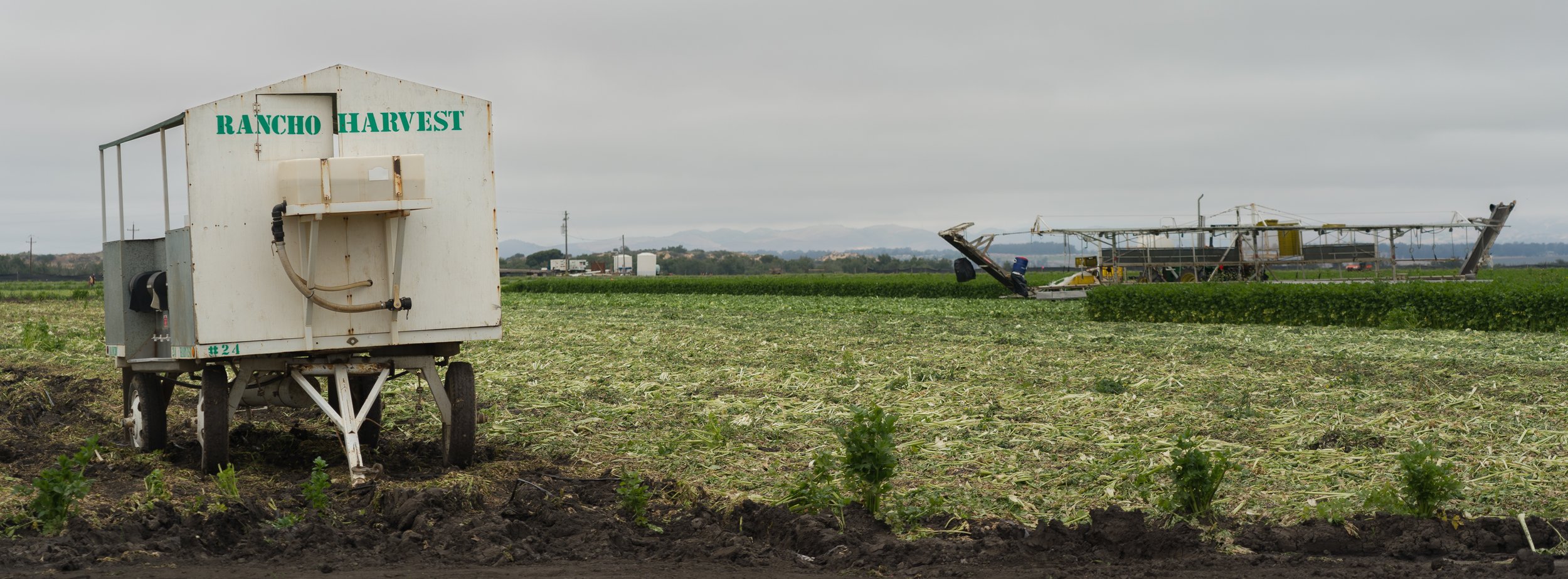
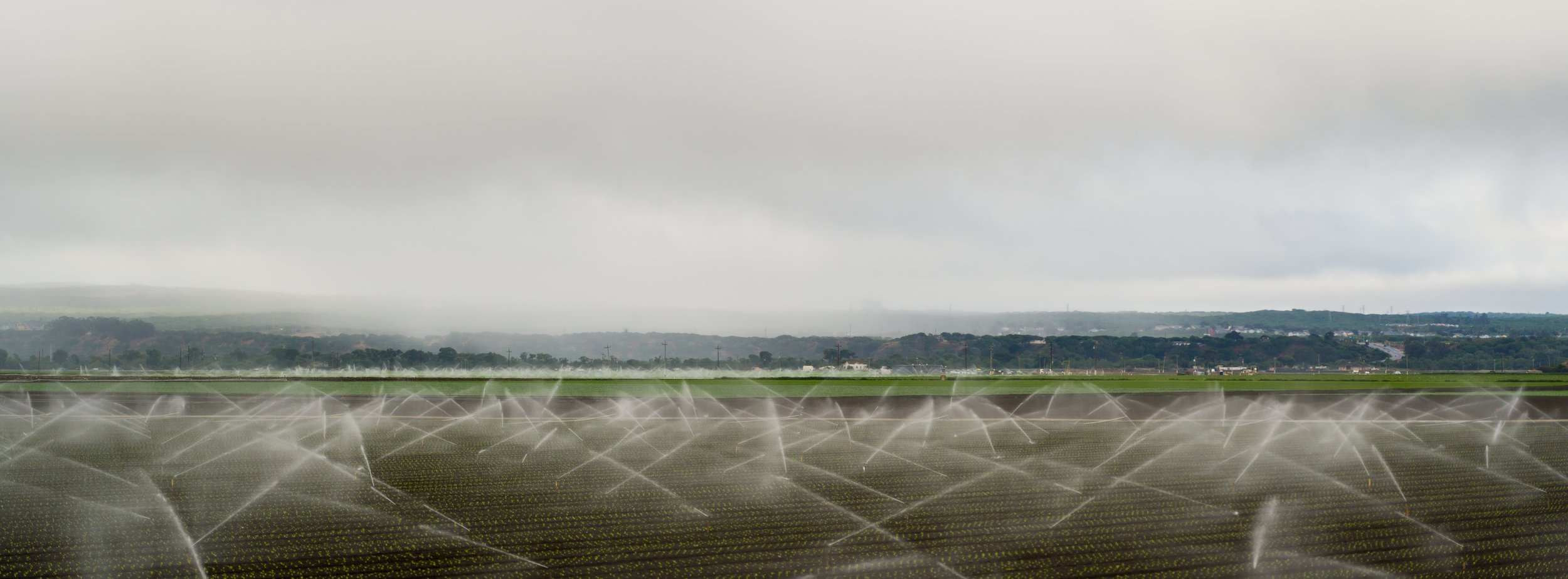

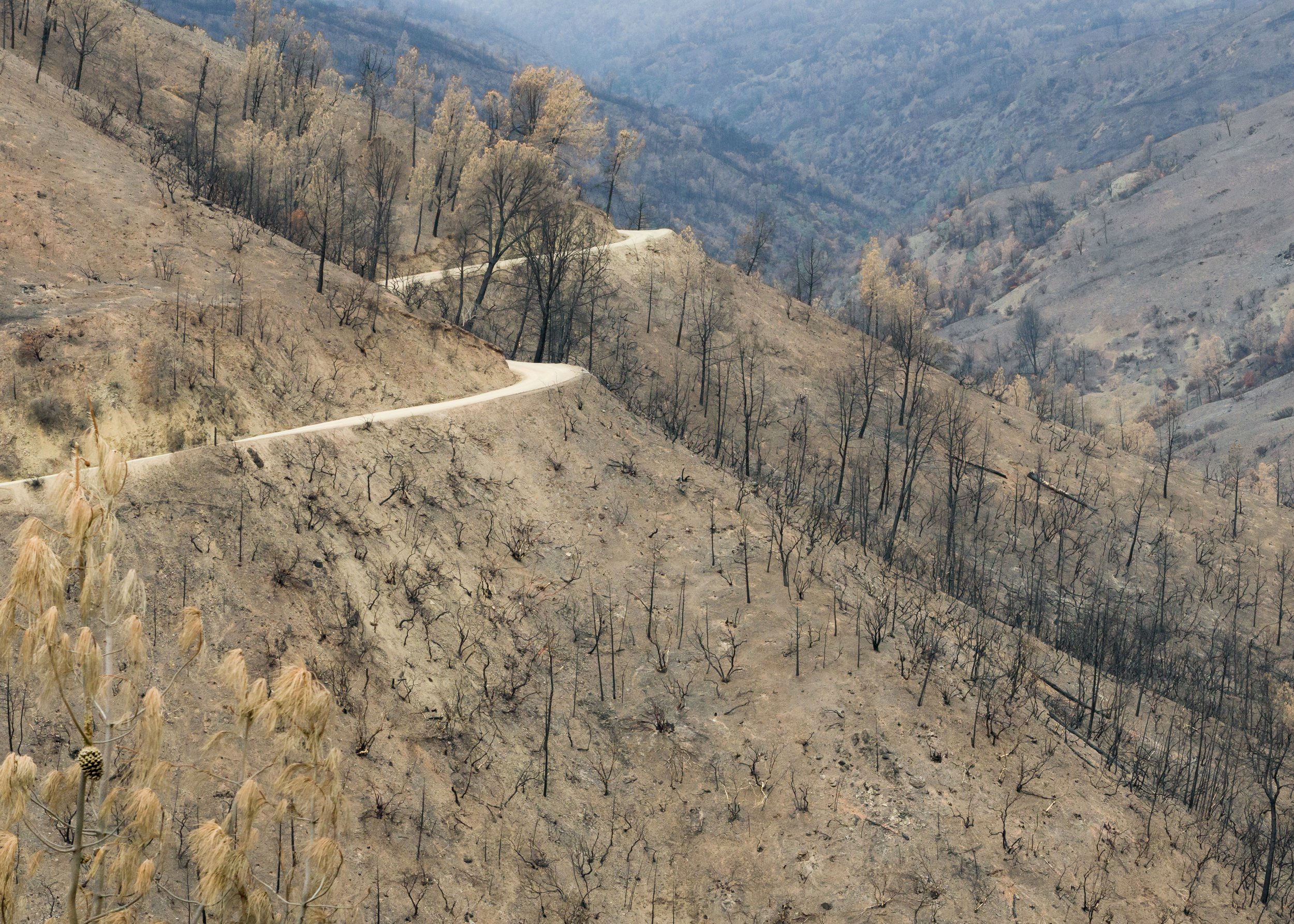

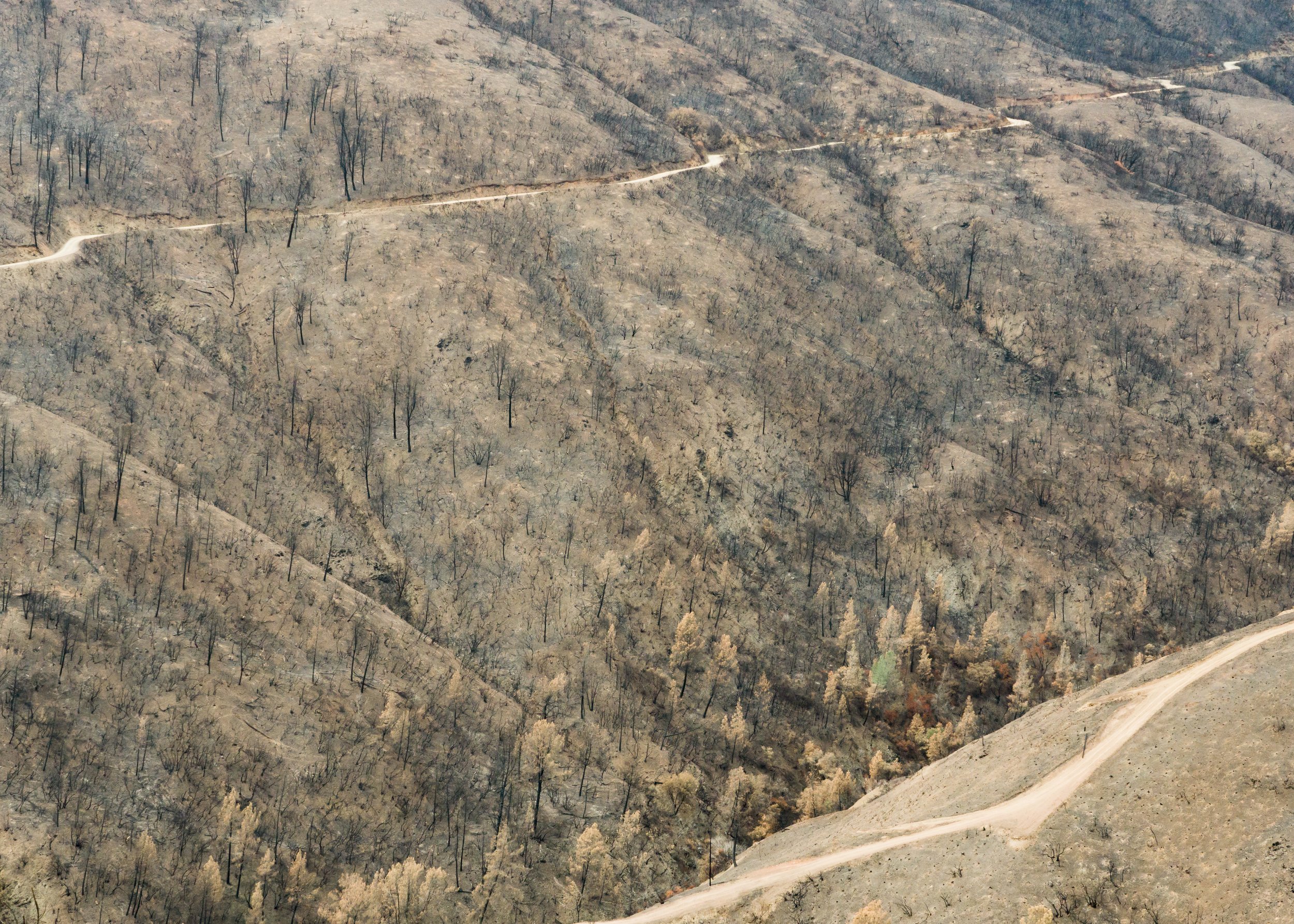
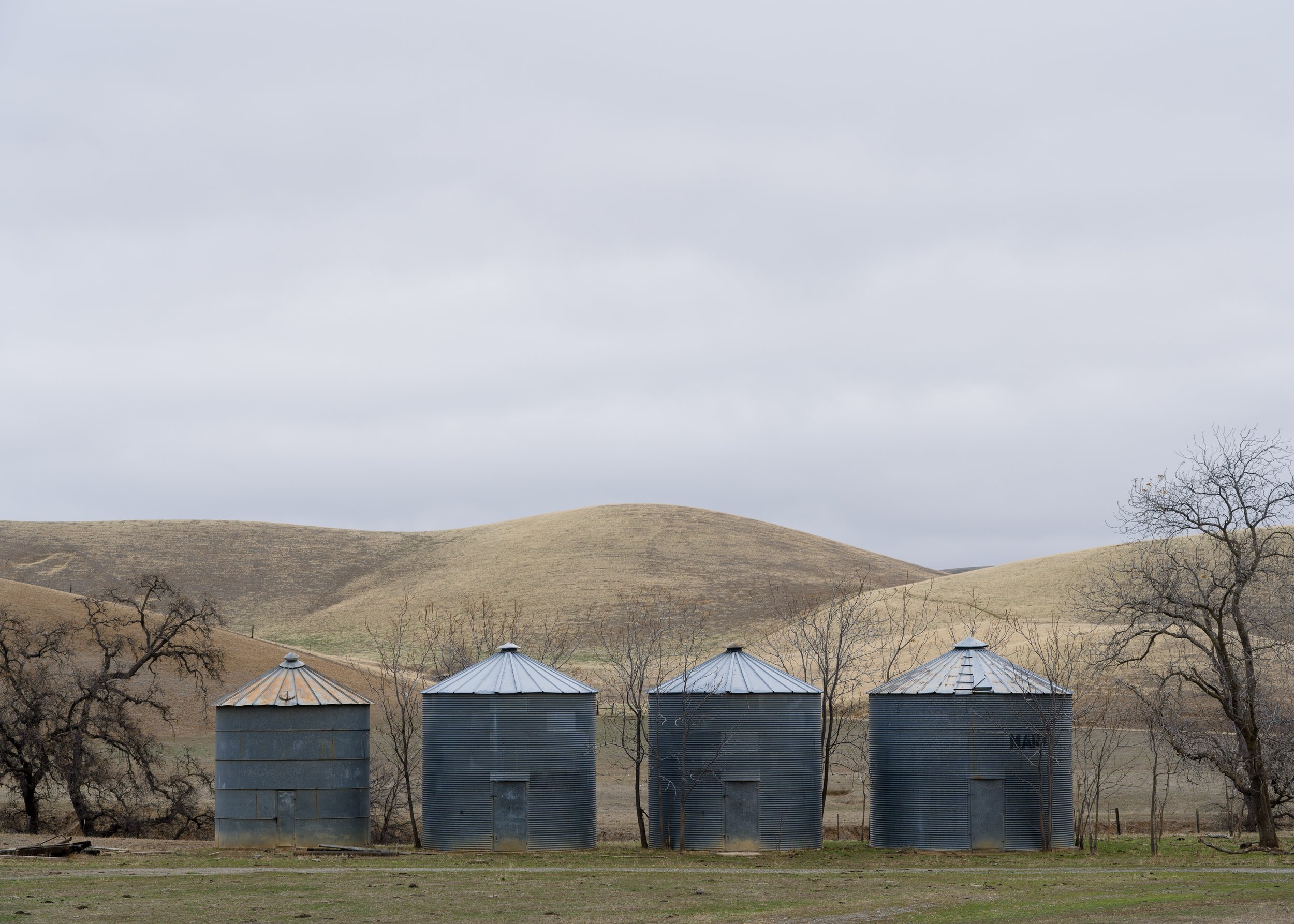
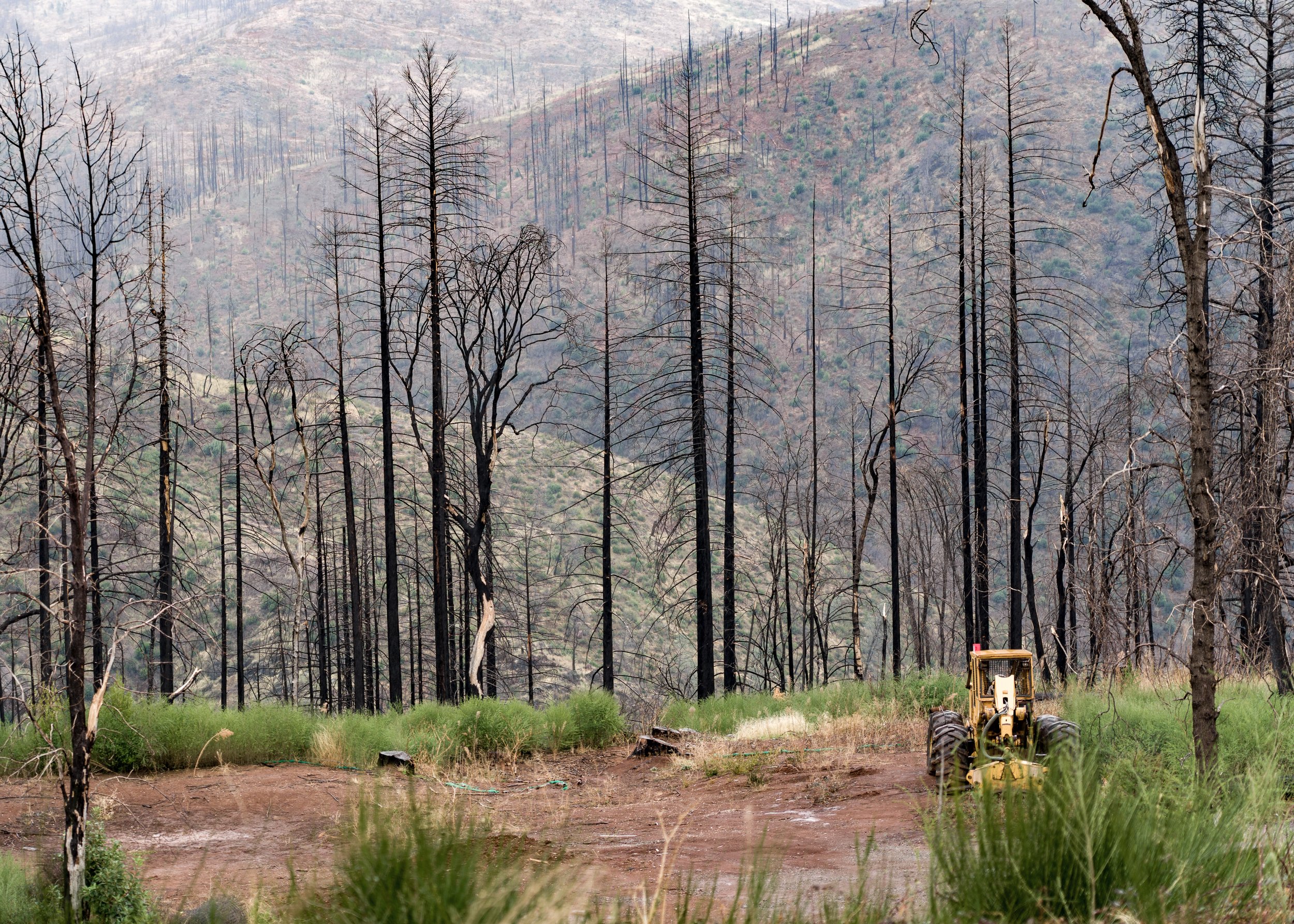
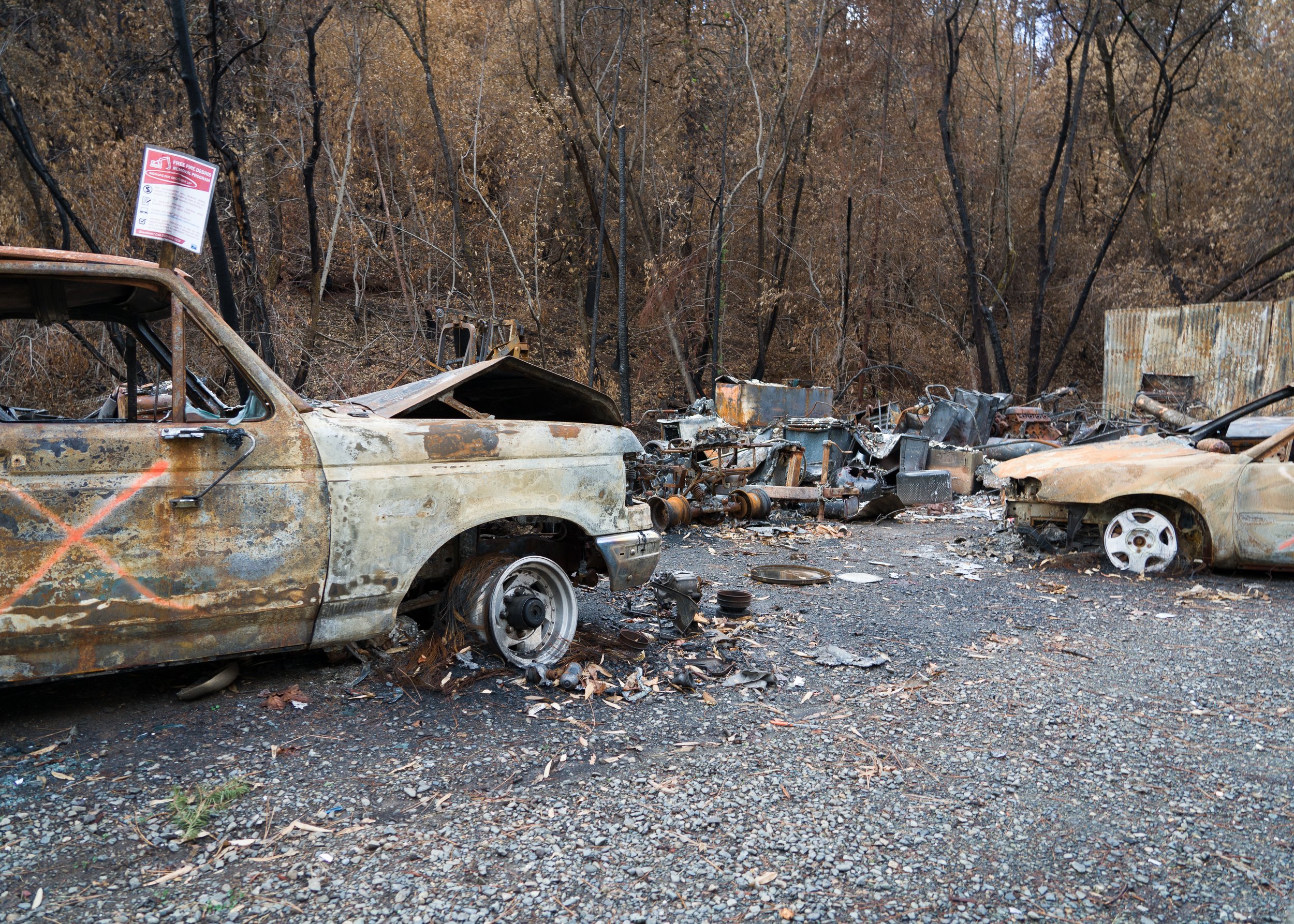
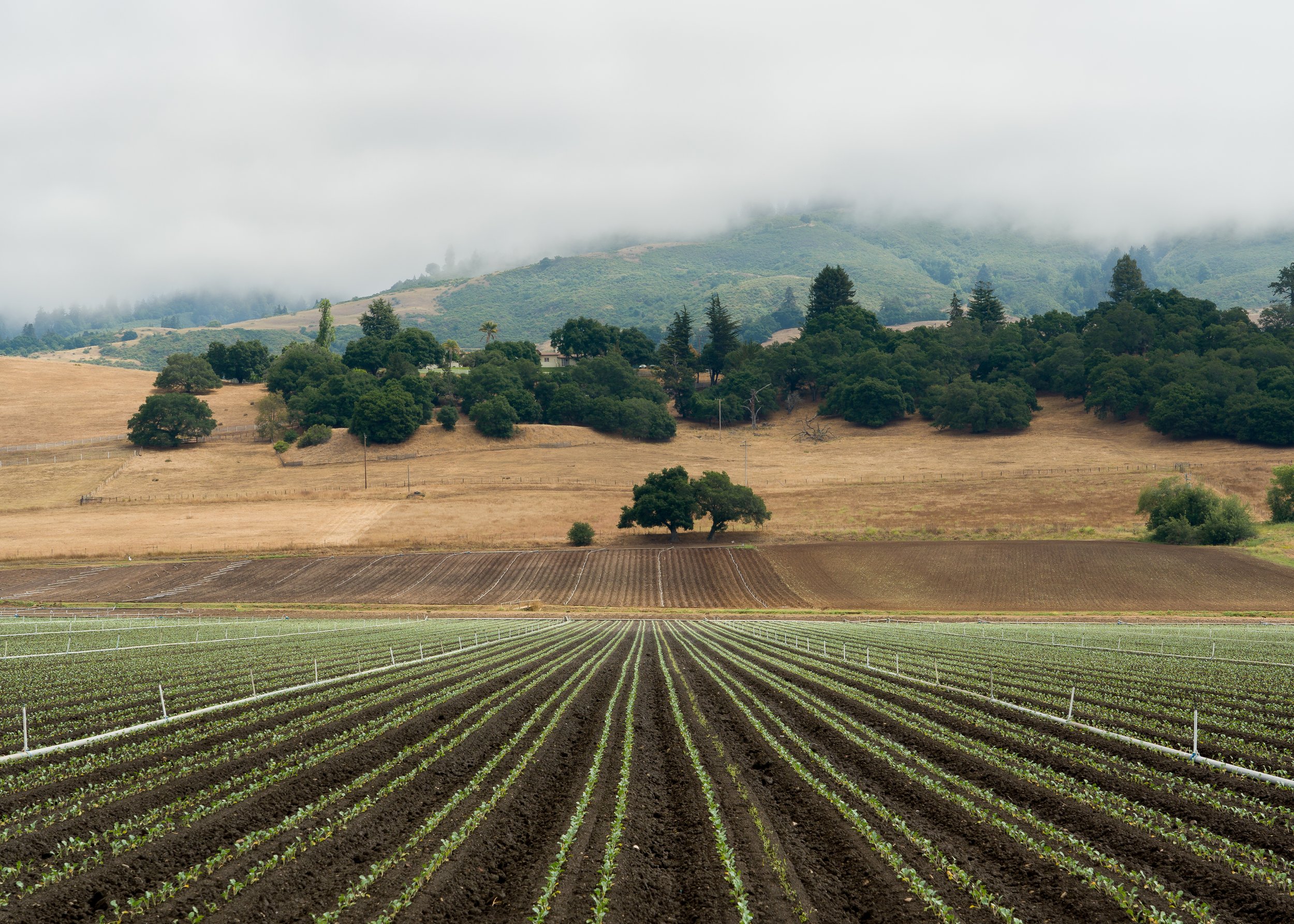
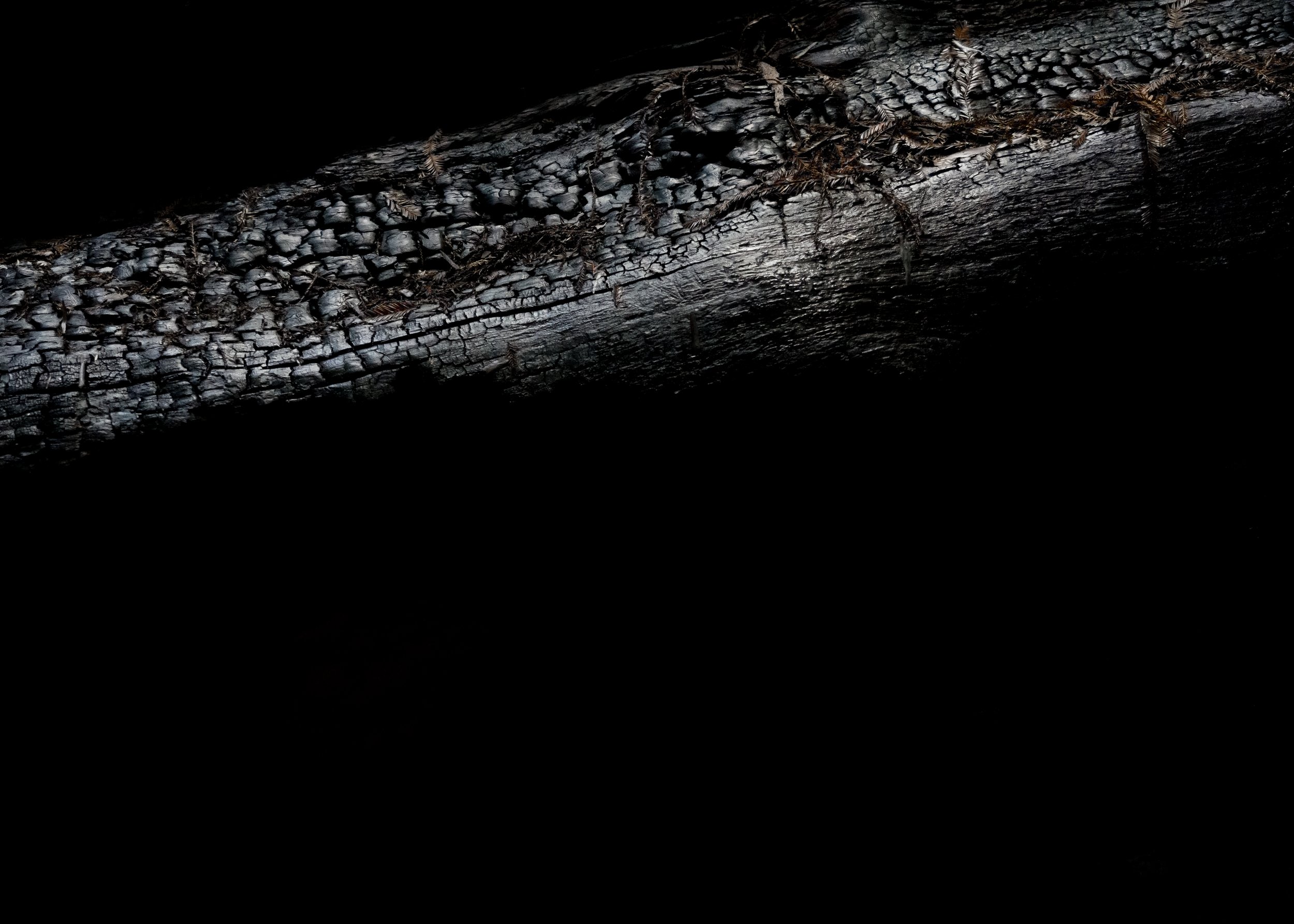
NOTE
The End of Rain is a multimedia work for orchestra, voices, and landscape photography. Its text is based on crowd-sourced input from 225 Californians who collectively contributed 80,000 words of first-hand stories of wildfire and drought. I gathered these stories between March and August 2021 through a combination of individual interviews, focus groups, school visits, and online input.
When I began collecting these words, California was emerging from the horrific 2020 wildfire season, which was among the worst in recorded history. The summers of 2018 and 2017 were similarly destructive, including the Camp Fire in Butte County which was the deadliest wildfire in California history.
I wanted to understand whether and how individuals and communities were changing their relationship to the landscape around them in response to this new era of continuous fire. Moreover, I wanted to understand how fire and drought are changing us emotionally in personal and often hidden ways. Because my questions concerned communal rather than individual consciousness, it was important to me that my work be guided by the experiences of a wide range of people and that the final product reflect the things they told me. I wanted my work to be an act of sustained and careful listening.
Each line of the poem is directly adapted from a firsthand witness account. Other than changing articles and pronouns for poetic unity, or combining the voices of multiple speakers into a single phrase, none of the words are my own. Whatever poetic strength the text possesses, therefore, owes to the fact that it is a work of non-fiction. Each line represents an individual telling the truth, as they see it, in simple and direct language. My task was to analyze this large body of raw material, to identify its representative themes, and to express the common voice or voices that emerged from the whispers, murmurs, and cries of the crowd.
These voices do not speak in unison. Many of the accounts describe acute experiences of fire or drought. Some respondents lost homes, others lost loved ones. They lost innumerable belongings. They lost longstanding beliefs about the landscape and its capacity to shelter and sustain them.
At the same time, people shared things they have gained. Many spoke of strengthened bonds in their community. Others gained a new appreciation for responsible stewardship of the land. Some gained a sense of urgency regarding our changing climate.
Other respondents did not have experience with the worst forms of tragedy or loss, but were impacted nonetheless. These voices, too, are important to understanding how fire and drought impact our communities each year. Many who live in urban centers and are ostensibly insulated from the most severe risks have begun to understand on a deep, intuitive level that we are all now living in an age of fire. We are all changing in response.
Lastly, some respondents indicated that they have lost nothing and have felt no particular impacts of fire or drought. These voices are essential if we wish to understand the full breadth and complexity of our collective experience.
In addition to widely varying personal stories, respondents shared a range of beliefs and attitudes on the subjects of fire, drought, urban development, environmental policy, and other topics. Often, one recurring theme comes into direct conflict with another recurring theme. I have sought to include these divergent voices in my text.
Formally, The End of Rain is divided into three parts. Each part reflects one predominant recurring theme in the crowd-sourced texts. Part 1: Emergency focuses on physical descriptions of the most acute impacts of fire. People shared vivid stories of blackened forests, strangely-colored skies, ash drifting like snow, and mid-day darkness. They described these days in the language of apocalypse, with terror, urgency, and fear.
Part 2: Pastoral explores a second theme in the texts: a strong love for and sense of connection to the natural environment of California. Landscape, identity, memory, and the sense of home are deeply intertwined, making damage to the land feel intensely personal.
Part 3 is a secular requiem expressing the loss, mourning, and remembrance that permeated the responses, coupled with a strong urge toward regeneration, rebuilding, and reawakening. These words of sorrow, fear, renewal, and rebirth reflect the intense emotional relationship respondents have with the natural world around them. The work ends with two interwoven lines of text which reflect the urgency and complexity of our relationship to fire in the era of climate change: “we must change now” and “things will grow back.” These two statements are both unequivocally true.
TEXT
By Scott Ordway based on crowdsourced stories from 225 Californians.
PROLOGUE
This is a book about a fire.
Its pages are written in sound.
This is a book about the end of rain.
Its pictures were grown in the ground.
This is a book about our home.
PART 1: EMERGENCY
I. These are the things we lost in the fire
My water
My clothing
My bedding
My birds
My letters
My music
My building
My home
I lost nothing.
My forest
My garden
My clean air
My time
My pearl necklace
Your artwork
My postcards
My hope
I lost the sense that
This place is heaven.
The brick walkway
The sky
The clouds on the walls
I lost all of your artwork
My clean air
Our dogwood
My Bible
My ash tree
Our shade
I lost everything.
My peace
My sleep
My balance
My food
My forest
My garden
My clean air
My innocence
I lost all I had left of my husband:
His uniform,
His medals,
The flag from his casket.
I lost the bed we shared.
My peace of mind
My sense of safety
My complacency
My sense of home
I lost the order of things.
We packed what we could and left.
I saw the birds hang their heads in sorrow.
We packed what we could and left.
I left my house without saying goodbye.
We packed what we could and left.
II. This is what we remember about that day
Ash
Falling from the sky, like snow.
I remember ash falling like snow and
Touching my face.
The sky was burning,
It was raining embers.
The smell of cinder and flesh:
The ash flew up into the earth, and
The hills were all black.
Sky
It was never daytime.
Street lights came on in the morning, and
The shadows of buildings were blue.
Everything was grey:
A permanent sunset,
Perpetual dusk.
The sky was yellow and
The sun was red.
I have a picture of the sky:
It was amber at first,
It was red like Mars.
The sky was brown and black,
The color of rust with a
Red glow in the distance.
Day had not come.
It was the end.
It was raining embers.
The sky was on fire.
Flame
I could see the fire in the distance:
Flames on the cliffs,
Houses burning on the hill to the west.
I close my eyes and I can still smell it:
This mix of wood and metal,
Even the bones.
The wind changed
Through burning forest,
Catching up to me.
Choking, smoke in my lungs,
It was too warm for evening.
I could not sense time.
I clung to my mother on the porch.
My father walked into the fire.
Sleep was over.
I was so scared.
III. This is what we miss
I used to dream of the mountains.
I used to dream of the trees.
I used to dream of the shade,
The wind,
The summer.
I miss the beauty,
I miss the fog,
I miss the full trees.
I miss the shade,
I miss the rain,
I miss seeing green.
I used to dream of the trees.
I miss the clean air,
I miss hide and seek,
I miss the forest.
I want to stay here.
PART 2: PASTORAL
IV. These are the crops we grow near our home
We grow strawberries.
We grow blueberries.
We grow plums and blackberries.
We grow peaches,
Nectarines,
Apples and pears,
Lemons and raspberries,
Cherries and oranges.
We grow strawberries.
We grow grapes, and
We grow grapes for wine.
We grow artichokes, and
Kale, corn, and cabbage,
Onions and garlic, and
Squash and garlic, and
Mushrooms and garlic, and
Lettuce and garlic, and...
We grow strawberries.
V. This is the land we see around us
We verge on desert,
Deep in the valley.
But at the same time,
We have this lushness near the river.
These trees,
These rocks,
These green grasslands,
The purple mountains far away.
I used to live in a
Shaded forest.
In the garden,
I could see the sun set
Between the trees.
We have roughness,
We have tenderness,
We have wild views, and
Soft hills, and meadows
Above the fog.
We have hills that feel like mountains, with
Long grasses, and
Mustard flowers in the spring.
I love the closeness of the stars.
We have redwood,
Kelp forest,
Oak forest,
Woods and streams,
The fir tree, and
The madrone.
I could see the sun set
Between the trees.
Rolling hills,
Steep mountains,
Wildflowers,
Solid trees from the mountains to the sea.
I love the closeness of the stars.
VI. These are the things we used to do
I walked, one step at a time:
I went to school,
I went to camp,
I watched the animals.
The mist would swirl around my ankles,
The tree would sway in the cool breeze,
The wasp would crawl from the moss.
I would watch the trees as they were watching me.
We were free.
The mountains, the valleys,
The caves, and the rivers were our kingdom.
We were free.
Before the fire:
I wrote novels,
I sang with my mother,
The music rang out from the building on the hill.
There were birthdays,
Weddings,
Anniversaries, and there was death.
It was a normal life.
I gave birth to my sons.
I watched the snow turn the pine trees white.
I found a sense of place.
I found a sense of peace.
I played with our grandchildren.
I went for walks.
There was water from the rain
For the lakes and the rivers.
I tended our vineyard.
I worked in the garden.
It was a normal life.
PART 3: REQUIEM
VII. These are the plants that grow where we live
We have lilac.
We have primrose.
We have lupine.
We have iris.
We have tulips.
We have poppies.
We have lilies.
We have daisies.
We have wild strawberries.
We have pine trees.
We have redwood.
We have poplar.
We have willow.
We have alder.
We have cedar.
We have dogwood and Douglas fir.
We have aspens that shake in the wind.
We have orange trees and groves.
We have lavender.
We have wallflower.
We have blackberry.
We have raspberry.
We have elderberry.
We have wild hyacinth.
We have ferns and wild roses.
Things will grow back.
VIII. This is how the land looks today
We need help.
The trail is gone.
Save our house,
Save our animals,
Save our water,
Save our home.
—
We went up two days later.
Trailers and sheds in the forest:
It was all gone.
All the life had gone.
It’s still like that for me.
—
Green returns
Amid the black corpses of trees.
Green sprouting up.
There is life everywhere.
—
Ash covers the ground
Like new snow.
I was homeless:
It was abrupt.
It was complete.
It was a wild place.
It was a wasteland, and the
Only light came from the fire.
—
Nature is starting again.
We are healing.
Our family grew.
Things will grow back.
—
The place where livestock roam
Is lush and green,
Growing more than before.
The mountains are still
In the background and the
Fruit trees bloom.
—
We must change.
We must create.
We must come together.
We must learn the new rules.
We must let go.
IX. Sunrise and apotheosis: things will grow back
I woke up with the light of the fire.
—
The weather is strange now:
The redwood survived.
The weather is strange now:
The land has survived.
The weather is strange now:
We will survive.
The weather is strange now:
The butterflies are coming back.
The weather is strange now:
The wind takes the place of the rain.
The seasons have changed.
We must change.
The weather is strange.
Things will grow back.
We must change now.
Things will grow back.
We must create now.
We must change.
We must let go now.
Things will grow back.
Ash covers the ground now.
We must learn the new rules now.
Things will grow back.
Hillside, canyon,
Farmland, forest,
Redwood, poplar,
Our home, our lives:
We must change now.
Things will grow back.

